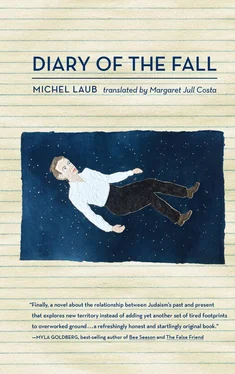25.
Was it the same as making a drawing of Hitler? After all, he was the man who ordered Auschwitz to be built and Auschwitz was the place that, according to my father, had destroyed my grandfather, so sending a note alluding to the subject was tantamount to saying that you knew and agreed and were even happy about the destruction of my grandfather, but obviously I still shouldn’t have responded as I did. First, because I wasn’t sure João was the person behind the drawings, and I still can’t be sure even now. I only found one of the drawings on the day when João was the last person to leave the classroom, a day on which I made a point of not getting in his way, going downstairs to the playground and, on my return, immediately hurrying over to look in my backpack as if I wanted to find something, and what I found certainly didn’t disappoint me, perhaps the most perfect of the drawings anyone had made during the eighth grade, Hitler mounted on a pig, in fact, I even kept the drawing and admired the details of the scene, the feet, the tail, the Star of David around the pig’s snout, and, second, because João would be sure to react in the way I expected.
26.
Maybe it was the same as with that classmate in the first week of term, maybe João saw in me an opportunity to assert himself now that he was stronger than me and had more friends and now that I was the only Jew in the building, and it would be easy enough to rally the whole of the eighth grade and the whole school to watch him drag me out into the middle of the playground, where there was a sandpit strategically located, in fact, I think it must be obligatory in any school to have a place where someone can be buried up to the neck, where one can trample and kick the fallen weakling who has long since abandoned any attempt to defend himself, but I wouldn’t expect João to react like that. I knew him well enough to know that he wouldn’t. I wrote those notes about his mother, one by one, every day, for as long as was necessary, knowing that this was the outer limit, that he wouldn’t be prepared to accuse me and fight me over that, because that would mean having to talk about it and say it out loud and let everyone be a witness to it, to the word mother that I had never once heard on his lips.
27.
It was his father who told me about João’s mother, during the conversation we had at their apartment, on the day when the two of us were left alone watching TV, that program whose audience was made up of transplants and crutches, and his father asked if I wasn’t sorry for what I’d done on his son’s birthday. João’s mother died before she was forty, when João was little more than a baby, of a cancer that began in her left breast and spread into her bones and chest, and in her final months she stayed at home almost all the time, because her father preferred that to keeping her in hospital, and after her death João’s father moved to a smaller apartment, taking none of the old furniture with him because everything reminded him of her, the bed where she had so often slept before she died, the table where she had so often eaten before she died, the dressing table where she used to sit to put on her makeup and fix her hair and where she had so often asked João’s father if she looked pretty or like someone who was dying.
28.
João couldn’t say anything about the notes, just as I couldn’t say anything about the drawings of Hitler, because he wouldn’t want to talk about his mother in public, just as I wouldn’t talk about my grandfather. It’s easy enough to know this, it’s simply a matter of putting yourself in the other person’s shoes, João seeing the notes for the first time, and on one of the notes, the gravediggers open up your mother’s coffin every day and screw her skeleton , I even attempted a drawing showing a raised tombstone, five men dressed in black, four standing and looking down and, inside the grave, a fifth man with the eyes and ears and smile of a devil, and I imagine that João stopped making or commissioning or encouraging whoever it was to produce those drawings of Hitler because of that devil with his legs astride a skeleton, which was all that remained of João’s mother, nothing else, just that drawing on a crumpled sheet of paper from an exercise book, no photograph because João’s father had decided to throw them all away, no story, and her name never spoken at home, and João’s father who never married again and never had a girlfriend and never again considered having more children because all those things would remind him of those final months, João’s mother in bed and the painkillers that no longer worked, and I could never forget the expression on his face as he told me that story when I was thirteen, João’s father asking me, do you know what it is to feel pain, do you know what it is to spend the whole day screaming in agony, you did what you did to my son and never even thought that there are people who spend months screaming in agony because there isn’t enough morphine in the world to relieve their pain, and it was then that João’s mother took the initiative, a bottle of painkillers too many, an hour too long left alone, a minute too long before João’s father opened the door and spoke to her and realized that something was wrong and then there was nothing more to be done.
A FEW MORE THINGS I KNOW ABOUT MYSELF
1.
There are various stages in any diagnosis of Alzheimer’s. First there’s a straightforward consultation, during which the doctor asks the patient about any memory lapses, if he smokes or drinks, if he’s on medication, if he’s had any serious illnesses or undergone treatment or surgery in recent years. The doctor takes the patient’s pulse, measures his blood pressure, arranges for him to have clinical tests for orientation and language, as well as CT and MRI scans, a dose of thyroid hormones, as well as calcium, phosphorus and vitamin B supplements, he also recommends having PET and SPECT scans, a series of procedures intended to exclude other possible causes of memory lapses, such as stress, dementia, arteriosclerosis, depression or a tumor.
2.
The majority of Alzheimer’s patients are aged eighty or over. My father belongs to the 3 percent or so aged between sixty and seventy-five, and to the minority whose symptoms were diagnosed at a relatively early stage. At that point, it’s possible to slow the pace of the disease with medication, whose technical function is to inhibit acetylcholinesterase, and by maintaining low levels of glycemia and cholesterol and doing regular exercises for the brain: sudoku, crossword puzzles, asking the patient what he’s just read in the newspaper and what he did or didn’t do that day.
3.
One often hears of patients making travel plans, reestablishing contact with relatives they’ve lost touch with, becoming wiser, more adaptable and more tolerant, and being as kind as possible to as many dear friends as possible. The first thing my father did was to arrange matters so that no one would be left with any nasty surprises later on. He updated me on his financial affairs, what property he owned, how the shops were doing in terms of accounts and share price. He also began keeping a kind of record — which, initially, I thought was just another of his memory exercises — the equivalent of a diary of what he ate for breakfast, how often he went to the toilet, who he talked to and what that person said, what they were wearing and what time they left.
4.
It would be pointless trying to imagine his reasoning at the time, and although it all seemed a bit morbid, I couldn’t oppose what became my father’s principal distraction: hours spent in his study like my grandfather, a project more or less like my grandfather’s, a memoir of the places my father had been to, the things he’d seen, the people he’d talked to, a selection of the most important facts drawn from more than sixty years of life.
Читать дальше












